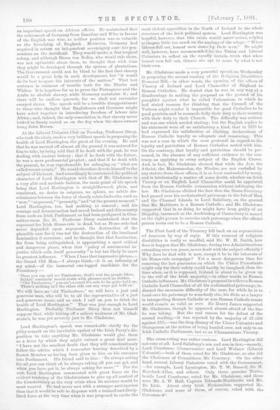Mr. Gladstone made a very powerful speech on. Wednesday in
proposing the second reading of his Religious Disabilities Removal Bill,—in other words, the opening of the offices of Viceroy of Ireland and Lord Chancellor of England to Roman Catholics. He denied. that he was in any way at a disadvantage in making the proposal on the ground of his pamphlet against what he called Vaticanism, in which he had stated reasons for thinking that the Council of the- Vatican might render it impossible for good Catholics to be good patriots, and to reconcile fully their duty to their country with their duty to their Church. The difficulty was serious, and was one which needed stating ; but the English replies to his statement were of so satisfactory a kind, that in 1875 he had expressed his satisfaction at eliciting declarations of Roman Catholic loyalty so adequate and reassuring. This was not a case in which the onus probandi in regard to the- loyalty and patriotism of Roman Catholics rested with him.. On the contrary, that loyalty and patriotism should be pre- sumed, in the absence of any sufficient evidence to the con- trary, as applying to every subject of the English Crown. And, in fact, Mr. Gladstone showed that while the Jew, the- Atheist, the Mahommedan, the Hindoo, are not excluded by any statute from these offices, it is at least contended by many, and is intrinsically a matter of some doubt, whether an .Irish Viceroy or an English Lord Chancellor could be appointed from the Roman Catholic communion without infringing the law, Mr. Gladstone elicited the fact that the Home Secretary had passed over his ecclesiastical patronage in the Isle of Man and the Channel Islands to Lord Salisbury, on the ground. that Mr. Matthews is a Roman Catholic ; and Mr. Gladstone suggested that in so doing he might have been guilty of an illegality, inasmuch as the Archbishop of Canterbury is named as the right person to exercise such patronage when the official patron turns out to be a Roman Catholic.










































 Previous page
Previous page